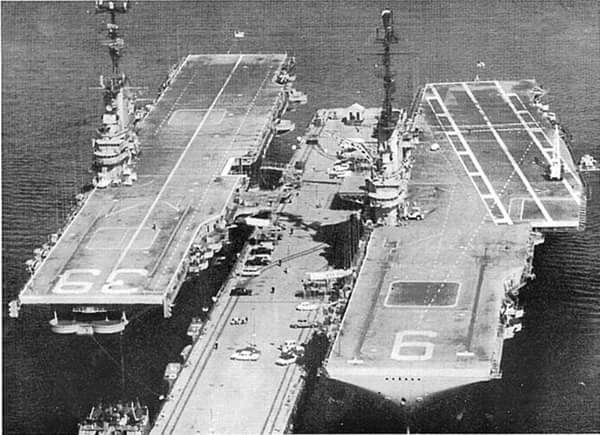

USS Lake Champlain CVS-39
We arrived at Quonset Point Naval Air Station late the evening of 14 Sep 1961. After the 6-hour bus trip from Philadelphia, all we wanted to do was hit the sack and get some sleep. But with the nature of the military, plans often do not work out the way you expect. Sometime around 3am, all the lights in the enlisted quarters came on at once. The night watch, a sailor who was actually from our own group, was walking along the racks, dragging his baton along the headboards; a very annoying way to be awakened. He started shouting out orders; “Get dressed as soon as possible”, and “Fall in for muster.” Thinking at first this was a boot-camp type move, many of us started grumbling.
We were so tired that no one
had noticed it was pouring rain with near hurricane force winds outside. East Coast tropical storm “Six”
was battering everything in sight.
Numbered the sixth storm of the season by the National Weather service,
its 65mph winds were just under the limit to be given a name but were strong
enough to cause damage.
As we dressed, we were given the reason for our abrupt awakening. The USS Lake Champlain, normally anchored with the USS Essex, had broken away from the pier and was drifting towards the rocks on the shore nearby. Looking out towards the other quarters (there were eight buildings arranged in two rows of four) it was apparent that everyone on base was being roused up. Dressing quickly, we ran the mile down to the pier. Too dark to see well, I was still overwhelmed by my first view of an aircraft carrier. We were soaked and grumpy as we arrived, but now we could see the problem. Turns out it was a very big problem.
The “Champ”, CVS-39 was commissioned 3 June 1945, just in
time for the end of WW-II. Weighing in
at 27,100 tons it was not a small ship.
She was capable of carrying up to 100 aircraft, but was nearly empty
this night. Normally the USS Essex would
be moored on the windward side of the pier but was not in port this night. Therefore the Champ had to bear the full
force of Mother Nature’s nasty mood.
Whether she was not fully secured or just broke the capstans, the ship
ended up on the rocks and was badly listing.
As my eyes adjusted to the dark, I began to see details on the shore side of the slip. The only light visible at first was from an open hanger bay door below the flight deck. A couple men were in the opening as all 27 thousand tons seemed about to capsize. The scene was unreal and I couldn’t help but wonder how only a hundred of us were going to pull her back upright. The answer came quickly as an officer took charge. Rescue tugboats that could pull the ship off the rocks were on the way over from Newport, RI Navy Base and were expected to arrive within the hour. Our job was to hold lines from the ship in an effort to keep it from listing further. It sounded like a super-human job.
The process turned out to be rather simple. All along the edge of the pier, were capstans which looked a bit like overgrown mushrooms. These were made of concrete with strong reinforcing steel beams inside. Our job was to take up the slack in the line and wrap it several times around the capstan. The danger lay in the fact that if the ship drifted further it could take the capstans and pier along with it.
The lines (2” thick ropes) were wrapped several times around the dozen or so capstans and then held by a line of 8 to 10 men each as we literally “weathered the storm.” After 45 long minutes working furiously to secure the ship, the officer in charge, for reasons unknown to us, declared the situation under control and told us to stand down and return to our barracks. As the sky was getting lighter, we trudged the mile back up to our quarters, still dripping wet from the storm. Too tired for a shower, I dried off, climbed in the sack with dry underwear on, and fell asleep almost immediately.
Most of us began to wake up around noon. We had helped to avert a very dangerous event for the “Champ”, and were pleasantly surprised to find that, as a reward for our hard work, all duties were cancelled for the day. My first night on active duty became a lifetime memory.